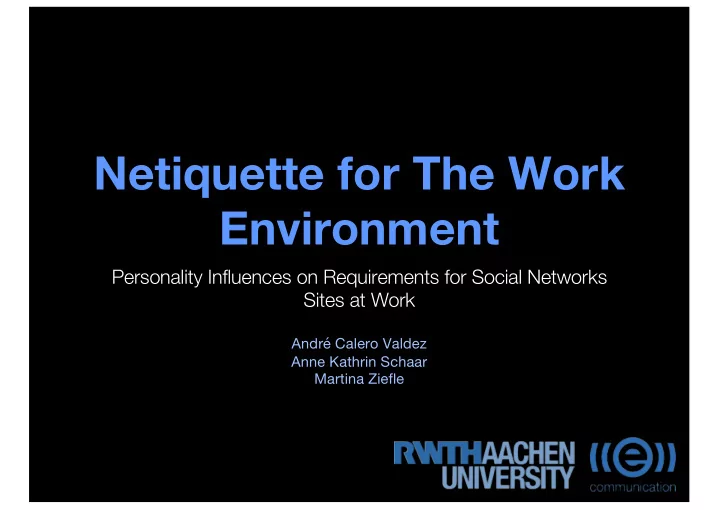

Netiquette for The Work Environment Personality Influences on Requirements for Social Networks Sites at Work André Calero Valdez Anne Kathrin Schaar Martina Ziefle
Agenda • Demographic change and changes in employment biographies • Social Networking Sites (SNS) • Questionnaire Study – Netiquette
Agenda • Demographic change and changes in employment biographies • Social Networking Sites (SNS) • Questionnaire Study – Netiquette
Demographic Change • Experienced workers who retire take their knowledge with them • In 2030 workforce size retirement age will shrink dramatically • How is this a problem and how can we compensate for this loss?
Skill Shortage • retirement of baby boomers • changes in employment biographies - shift to project work - short-term contracting - temporary employment - parental leave
New Innovation Requirements • fast information interchange, resource allocation, training of new employees • conservation of business critical information & knowledge • flexible working hours, international business relationships
Agenda • Demographic change and changes in employment biographies • Social Networking Sites (SNS) • Questionnaire Study – Netiquette
What is a SNS? • For instance: Facebook • web-platform which allows users to connect each other • communication platform • allows group forming
SNS Benefits • SNS can be used to satisfy these new innovation requirements • conserve information (on the fly) • flexible worldwide access • support different ways of communication
SNS Usefulness • n - network size • value of the network: • Metcalf ‘ s law: n ² - all possible connections • Reed ‘ s law: c ⁿ - sub-networks multiply value • value depends on # of active participants
Get employees to use it!
Important Criteria • user diversity: age, gender, technical expertise, technical divide • Beyond barrier ‘ s and motives • privacy, control, functional scope, relationship topology • Previous finding: People need rules for communication
Agenda • Demographic change and changes in employment biographies • Social Networking Sites (SNS) • Questionnaire Study – Netiquette
Questionnaire Study • Quantitative study, standardized metrics • Young knowledge workers (ages 20-59, M=29, SD=10, N=99) • high adoption of private use (89% use Social Media) • low adoption for professional use (31%)
Questionnaire • Online survey with preselected target audience • Independent variables: • Demographic data • Social Media Liking • Agreeableness FFM-A (6 items α =.716) • Conscientiousness FFM-C (6 items α =.887) • Formal Correctness (6 items α =.820)
Dependent Variables (1/2) • Importance of 5 etiquette scales using 3 items each • Formal Addressing (Dear Mrs.,.) – α =.918 • Abbreviation Rejection (no abbr, LOL) - α =.831 • Emoticon Rejection ;-) - α =.775 • Perceived Urgency (reply quickly!!!) - α =.789 • Work Disruption (reply now!!!) - α =.789
Dependent Variables (2/2) • All of these measures for 3 different media • Email • Chat • Blog • Behavioral Intention
Differences Between Media Formal Addressing Formal Correctness Emoticon Rejection E-Mail Chat Abbreviation Rejection Blog Perceived Urgency Work Disruption 1 2 3 4 5 6 Ag Agreement
Multiple Regression Analysis • Performed for between subject effects • No effect of agreeableness • Gender only influences perceived urgency
MLR Results
Conclusion • A SNS for the work environment should allow different media for different purposes. • Companies require netiqutte inline with their employees. • When younger users work with older users, use a netiquette that suits the older and more conscientious users.
Thank you for your attention! www.comm.rwth-aachen.de
Recommend
More recommend